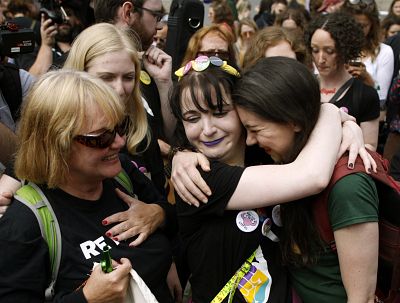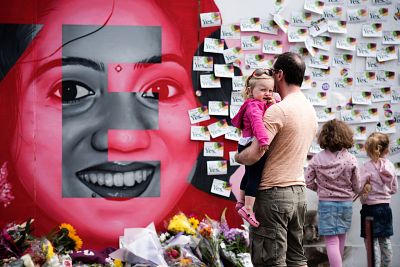Ireland's Prime Minister described the result as the culmination of a "quiet revolution" in what was once one of Europe's most socially conservative countries.
LONDON — Ireland voted to overturn its constitutional ban on abortion Saturday in the latest example of how the traditionally Catholic country is embracing a more liberal stance.
More than 66 percent of Irish voters chose to repeal the Eighth Amendment, which has effectively banned abortion in the nation since its passage in 1983. The amendment says an unborn child has the same right to life as a pregnant woman. Abortion was not permitted in cases of rape, incest or fetal abnormalities.
Irish Prime Minister Leo Varadkar, who is in favor of the change, said the vote to repeal the ban represents "the culmination of a quiet revolution that has been taking place in Ireland over the last couple of decades."
The result comes three years after Ireland became the first country in the world to legalize same-sex marriage by popular vote, and a year after Varadkar, an openly-gay politician and son of an Indian immigrant, became Prime Minister.
Once a deeply religious country — Ireland only voted to legalize divorce by a razor-thin majority in 1995 — the authority of the Roman Catholic Church and its reputation has been damaged in a series of scandals over the past 20 years.
Siobhan Donohue, chairwoman for Termination for Medical Reasons (TFMR), an abortion rights campaign group, described the result as "a hugely significant and hugely historic step forward."
Donohue, who had to travel to neighboring Britain to have an abortion when her baby TJ was diagnosed with a fetal anomaly, said she felt relieved.
"It confirmed to us that we do live in a compassionate country, which we thought we did but we didn't know how far it reached," she said.
"There was a lot of worry and a lot of concern over if it didn't pass, what would happen," she told NBC News from Dublin. "Having shared our stories and shared our experiences, if people had voted 'no' what would that have meant for us?"
But Donohue warned that the fight was not over, and that people in Ireland will still have to travel to Britain in order to receive an abortion in coming weeks until the law is changed. "But it's the first, big and important step," she said.
Orla Halpenny, a doctor and spokesperson for the anti-abortion group Doctors for Life, described the result as "disappointing."
"All medical pro-life groups are needed now more than ever," she said, adding that Doctors for Life will be very busy ensuring that doctors were granted "genuine" conscientious objection.
Halpenny said she was concerned that doctors will not be given the right to refuse to refer patients on to termination services.
It now falls on Parliament to establish new laws governing abortions.
The government proposes that the law be changed to allow unrestricted access to abortions up to 12 weeks of pregnancy. Later abortions would also be allowed in special circumstances.
Ireland has some of the most restrictive abortion laws in the European Union, with Malta — where abortion is banned under all circumstances— the only member of the 28-country bloc with tighter legislation.
The referendum follows an emotive and often acrimonious campaign. More than 3.2 million people registered to vote in the referendum.
Ireland is one of the few E.U. countries that does not allow those abroad to vote by mail or at embassies, so many expatriates traveled to cast their ballots and shared their journeys on social media under the hashtag #hometovote.
Amnesty International welcomed the referendum result as "a victory for equality, for dignity, for respect and compassion." But said Northern Ireland's abortion laws must now be relaxed.
Access to abortion is also highly restricted across the border in Northern Ireland, which is part of United Kingdom.













